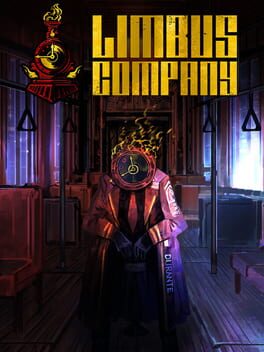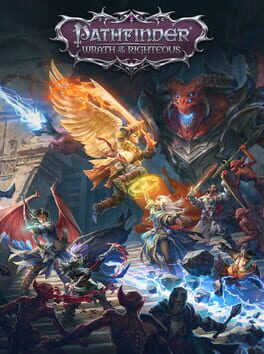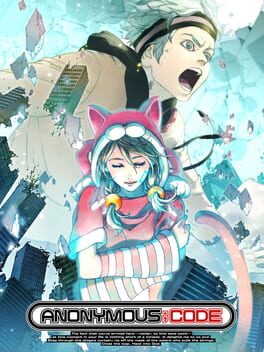2009
2023
2023
The most visually joyful game ever made about how terrible is a society run by coffee addicts.
Hi-Fi Rush is a gem of a spectacle fighter hack-n-slash, it is entirely devoted to the idea of feeling the beat, following the rhythm and grooving while styling over your enemies, with a Devil-May-Cry-laundry-list of options at the player’s disposal. On some stages, the whole shtick may become way too cluttered for its own good and it’s hard to react precisely to each visual and audio stimuli, but generally the game will rarely put too much enemies in one room for this to be the case. And even then the loads of content in each scenario is just proof of the intense love that was put into this world; there are no sections, rooms or fights that appear lazily done or put there just to pad the game. The pacing is frenetic when it needs to be and leaves a lot of room for the player to breathe between each setpiece, with an art style and soundtrack that are the epitome of fun!
Thematically, the game is about the escapades of Chai and the merry gang of social disruptors trying to improve the lives of the general population by wrecking the corporation responsible for drowning the world in consumerism. It is a beautiful coincidence that, just a few months after Cyberpunk Edgerunners tried the colourful approach to cyberpunk just to beat the dead horse of the status quo again and generally doing nothing with its genre, a simple video game made with loads of passion is capable of presenting, with light-heartedness but enough care, the issue (overtly rich delusional egomaniacs), the solution (beating them a lot with a stick) and the lesson (actually achieving something of value in life requires effort, not nepotism, and being led by the latter freaking sucks).
Moreso, Hi-Fi Rush is also a majorly significant title for the year it released in 2023, and what it signifies for the market of video games. As Ben "Yahtzee" Croshaw eloquently put at the time the game came out, “the way it was dropped on us felt for me like an act of surrender. “OK, fine,” Bethesda seemed to be saying. “We officially give up trying to convince you that what you want is overpriced mediocre crap that’s a thousand hours long. Here’s a game that’s ten hours long but it’s thirty bucks and really fucking good.” And what do you know, it did gangbusters.”
Hi-Fi Rush is a gem of a spectacle fighter hack-n-slash, it is entirely devoted to the idea of feeling the beat, following the rhythm and grooving while styling over your enemies, with a Devil-May-Cry-laundry-list of options at the player’s disposal. On some stages, the whole shtick may become way too cluttered for its own good and it’s hard to react precisely to each visual and audio stimuli, but generally the game will rarely put too much enemies in one room for this to be the case. And even then the loads of content in each scenario is just proof of the intense love that was put into this world; there are no sections, rooms or fights that appear lazily done or put there just to pad the game. The pacing is frenetic when it needs to be and leaves a lot of room for the player to breathe between each setpiece, with an art style and soundtrack that are the epitome of fun!
Thematically, the game is about the escapades of Chai and the merry gang of social disruptors trying to improve the lives of the general population by wrecking the corporation responsible for drowning the world in consumerism. It is a beautiful coincidence that, just a few months after Cyberpunk Edgerunners tried the colourful approach to cyberpunk just to beat the dead horse of the status quo again and generally doing nothing with its genre, a simple video game made with loads of passion is capable of presenting, with light-heartedness but enough care, the issue (overtly rich delusional egomaniacs), the solution (beating them a lot with a stick) and the lesson (actually achieving something of value in life requires effort, not nepotism, and being led by the latter freaking sucks).
Moreso, Hi-Fi Rush is also a majorly significant title for the year it released in 2023, and what it signifies for the market of video games. As Ben "Yahtzee" Croshaw eloquently put at the time the game came out, “the way it was dropped on us felt for me like an act of surrender. “OK, fine,” Bethesda seemed to be saying. “We officially give up trying to convince you that what you want is overpriced mediocre crap that’s a thousand hours long. Here’s a game that’s ten hours long but it’s thirty bucks and really fucking good.” And what do you know, it did gangbusters.”
2016
During the 90s, Japan had one of the most interesting outputs in its pop culture. The country was going through the shitter, the bubble had burst and the economy was falling down the drain, many elders resenting modernization, as they saw it as the harbinger of ruin for the traditional values of the nation, and many young people blaming the so-called baby-boomers for causing the economy to, inevitably, shift this way. Technology, Japan vanguard’s industry and pride and joy for many years, was now a symbol of a world hurrying towards its demise; authors across many media between Kurosawa Kyoshi, Okazaki Kyoko, Oshii Mamoru and so on, all lived through this period on a wave of pessimism and skepticism toward the future. Humanity was going to end, and humanity was to blame for it.
Enter stage left Suda Goichi, dropping The Silver Case just at the turn of the century, in the year 1999, as the ultimate side-note of this societal decline. The world of the Silver Case is bleak, unsettling, sad, weird, oftentimes the characters will talk and make little sense to each other between slurs, asides and weird mental lapses (the subpar translation not really helping with this one), and the whole cast seems completely lost rationalizing what’s going on.
The plot revolves around a murder case (plus several other investigations) that slowly unravels into a much more complex web of intrigues and twists, so convoluted that, whenever a character appears to know exactly what has happened and why, it sounds almost farcical. Everyone simultaneously understands and ignores what is actually going on at all times, the mood is made of pure confusion and people sounding absolutely sure of what they are talking about, whilst to the players is conveyed the feeling that nothing ever makes sense. It really oozes the confounded angst of living through a decade of dark age and social isolation. The cast ultimately doesn’t matter, they might share cute, poignant and touching vignettes between them but there is no singular central character that ever shows any emotion or growth; most of them are passive actors in a play that has to be acted for the sake of the world having to keep turning around.
Young people find solace in their shared loneliness and turn to the internet to feel accepted and comforted while the elderly fight to handle the strings of a wooden puppet they once built but it’s already rotten and fallen to pieces. There is a lot to unpack in The Silver Case and how much of its despair was subsequently answered, by Suda himself, in Flower, Sun and Rain a couple of years later. If The Silver Case reads like the societal collapse of morality and reason seen in the post-apocalypse of Eden: It’s an Endless World, then Flower, Sun and Rain is the peaceful twilight where life matters in the here and now of the post-apocalypse in Yokohama Kaidashi Kikou.
Kill the past, it will never make much sense the more you think about it, once you acknowledge it it’s already time to move on.
Enter stage left Suda Goichi, dropping The Silver Case just at the turn of the century, in the year 1999, as the ultimate side-note of this societal decline. The world of the Silver Case is bleak, unsettling, sad, weird, oftentimes the characters will talk and make little sense to each other between slurs, asides and weird mental lapses (the subpar translation not really helping with this one), and the whole cast seems completely lost rationalizing what’s going on.
The plot revolves around a murder case (plus several other investigations) that slowly unravels into a much more complex web of intrigues and twists, so convoluted that, whenever a character appears to know exactly what has happened and why, it sounds almost farcical. Everyone simultaneously understands and ignores what is actually going on at all times, the mood is made of pure confusion and people sounding absolutely sure of what they are talking about, whilst to the players is conveyed the feeling that nothing ever makes sense. It really oozes the confounded angst of living through a decade of dark age and social isolation. The cast ultimately doesn’t matter, they might share cute, poignant and touching vignettes between them but there is no singular central character that ever shows any emotion or growth; most of them are passive actors in a play that has to be acted for the sake of the world having to keep turning around.
Young people find solace in their shared loneliness and turn to the internet to feel accepted and comforted while the elderly fight to handle the strings of a wooden puppet they once built but it’s already rotten and fallen to pieces. There is a lot to unpack in The Silver Case and how much of its despair was subsequently answered, by Suda himself, in Flower, Sun and Rain a couple of years later. If The Silver Case reads like the societal collapse of morality and reason seen in the post-apocalypse of Eden: It’s an Endless World, then Flower, Sun and Rain is the peaceful twilight where life matters in the here and now of the post-apocalypse in Yokohama Kaidashi Kikou.
Kill the past, it will never make much sense the more you think about it, once you acknowledge it it’s already time to move on.
2022
2023
Limbo was once given for free on steam, Inside was gifted to me, so was Cocoon. I was never personally interested in any of these titles yet I had to play them, if anything out of courtesy. I have nothing against Jeppe Carlsen, I respect that he is able to fully commit to the games he wants to make, but from the moment I pressed start, without even knowing he was behind this game, I was already yawning, I can physically perceive my body aging and withering while playing this.
Edit: I got over myself. The game is fine to good for what is wants to do. Still boring
Edit: I got over myself. The game is fine to good for what is wants to do. Still boring
2020
This review contains spoilers
Partway through Chapter 1, Omori had already disappointed me in the way it refused to balance, in any way whatsoever, its diegetic and thematic narrative. The prologue hit very strongly by luring the player into a sense of security and cuteness with all the sugary vibes, readying the stage for the rug-pull that would snap the story back to reality and kickstart the “hero’s” journey. All the pieces showed thus far, metaphorical in their nature, would soon be paralleled by their counterpart in the true world of Faraway City, highlighting the complex coping mechanism that Sunny built for himself to escape a reality that had all the elements he once cherished and loved, but wrong, broken, different, and for the most part due to his own faults. While not groundbreaking, this is a very solid foundation for the fiction and meta-fiction alike, again a very intriguing and well built prologue.
But then the game stumbles, misses almost all the subsequent steps by acknowledging that the plot is happening during the countdown to Sunny’s departure from the city, his crime never to be discovered in the ultimate avoidance of responsibility, but at the same time the actual game still takes place in the dream world that Sunny built as Omori. This is a tonally deaf and utterly baffling narrative choice, especially because it rarely even matters by that point what goes on in the inner mind of the murderer. The pieces are already in motion, the dream world had already achieved its goal by stalling the player, as it stalled Sunny, in the incipit of the game and yet, long after opening the door to accept the real world again, we are still asked to travel inside a whale’s belly and fight magical slime girls. Lightening the mood to unwind after a big revelation is one way to show restrain for the emotional highs that Omori is capable of, but following an hour of strong bonding between the main characters, catching up after four years of separation, with a three hour castle dungeon to solve Sweetheart’s pointless marriage struggles is effectively blue-balling, none of this ever matters. The dream contents not strictly tying to any meaningful allegory wouldn’t even be an issue, if they gave insight to the characters, were engaging, fun or quirky in some way, but none of this is true; what actually happens is that the game, for ¾ of its duration, chooses to ignore what it’s actually trying to tell to become a distractingly standard RPG.
The last stretch of the game, as well as its most impactful scenes, are top class for the genre, with their stellar production values and emotionally charged writing, but anything in between is just fluff, cute fluff but nonetheless unnecessary padded fluff. The one great thing about even the worst of 16bit indie RPGs made in the last two decade is that they are straight to the point to a fault, Omori on the other hand feels like it needs to be 20 hours long because then it would be a real video game like the big boys on the Steam front-page, I cannot find any other reasonable explanation for all its disjointedness.
But then the game stumbles, misses almost all the subsequent steps by acknowledging that the plot is happening during the countdown to Sunny’s departure from the city, his crime never to be discovered in the ultimate avoidance of responsibility, but at the same time the actual game still takes place in the dream world that Sunny built as Omori. This is a tonally deaf and utterly baffling narrative choice, especially because it rarely even matters by that point what goes on in the inner mind of the murderer. The pieces are already in motion, the dream world had already achieved its goal by stalling the player, as it stalled Sunny, in the incipit of the game and yet, long after opening the door to accept the real world again, we are still asked to travel inside a whale’s belly and fight magical slime girls. Lightening the mood to unwind after a big revelation is one way to show restrain for the emotional highs that Omori is capable of, but following an hour of strong bonding between the main characters, catching up after four years of separation, with a three hour castle dungeon to solve Sweetheart’s pointless marriage struggles is effectively blue-balling, none of this ever matters. The dream contents not strictly tying to any meaningful allegory wouldn’t even be an issue, if they gave insight to the characters, were engaging, fun or quirky in some way, but none of this is true; what actually happens is that the game, for ¾ of its duration, chooses to ignore what it’s actually trying to tell to become a distractingly standard RPG.
The last stretch of the game, as well as its most impactful scenes, are top class for the genre, with their stellar production values and emotionally charged writing, but anything in between is just fluff, cute fluff but nonetheless unnecessary padded fluff. The one great thing about even the worst of 16bit indie RPGs made in the last two decade is that they are straight to the point to a fault, Omori on the other hand feels like it needs to be 20 hours long because then it would be a real video game like the big boys on the Steam front-page, I cannot find any other reasonable explanation for all its disjointedness.







